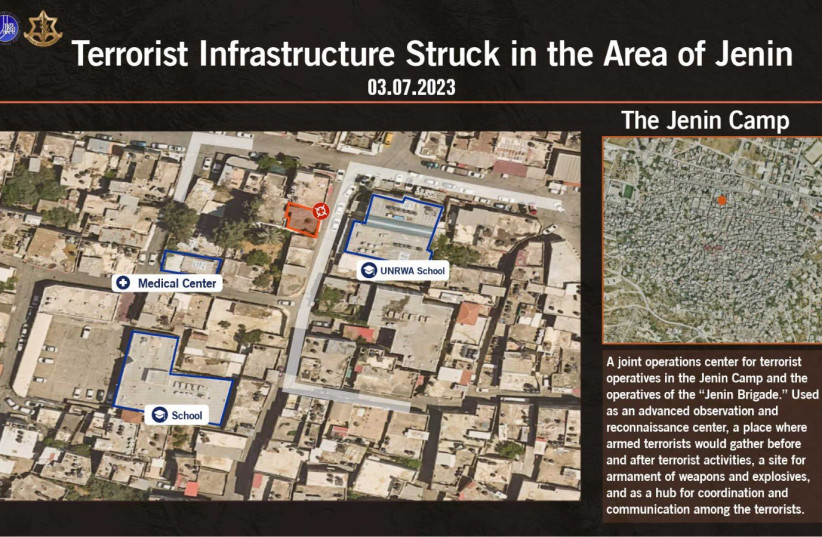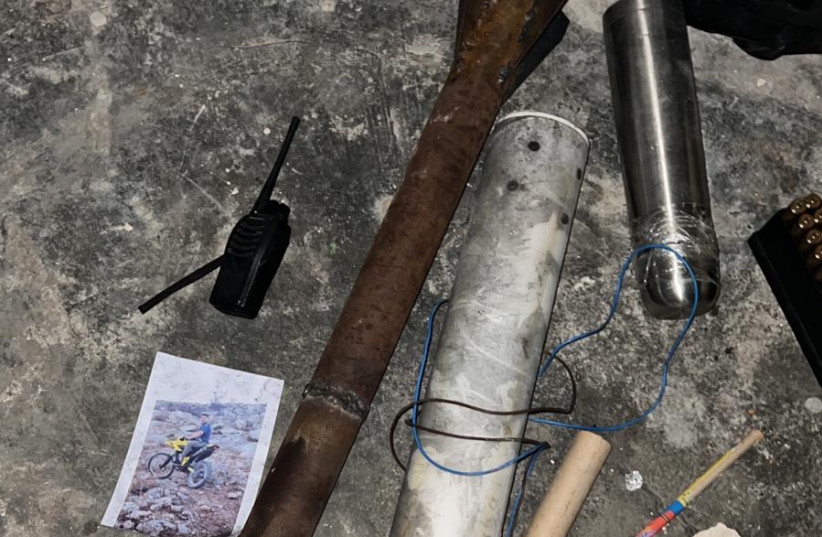The IDF on Sunday night launched its largest operation in Jenin since the Second Intifada with a series of more than ten airstrikes and moving brigade-level forces into the northern West Bank Palestinian city.
IDF sources and the political echelon made it clear that they were significantly upping the level of force being used to end a wave of terror dating back to March 2022, but the IDF home front command also got ready for potential revenge attacks by Hezbollah in Lebanon or Hamas and Islamic Jihad in Gaza.
The IDF Chief Spokesperson Brig.-Gen. Daniel Hagari said early Monday that as of now the operation is focused on Jenin, but that it could expand to other parts of the northern West Bank, also known as Samaria.
There were no indications that the IDF would expand the operation to the central and southern portions of the West Bank.
Duration and strategy in Jenin operation
Hagari refused to set a timeline for the operation, but the impression was that it would last a minimum of several days, and could easily last weeks or longer, but would not be open-ended and would not lead to the IDF trying to permanently hold territory in any way.
It was also possible that the IDF might leave Jenin within days, but then initiate another large-scale operation elsewhere.
The IDF was careful not to attack any Palestinian Authority security forces and Hagari specifically said that the operation is against local Jenin terror groups and not the PA.
According to Hagari, the strategy of the operation was to root out a deep and systematically developed terror apparatus in Jenin, which has grown over several months and has gone way out of control. He said over 50 terror attacks emanated from Jenin and over 19 terrorists have tried to escape there after carrying out attacks.

Operation outcomes and the human toll
Over 300 Palestinian improvised explosives were seized and a couple dozen key terror command and control and other targets were destroyed.
The Palestinian Ministry of Health said on Monday evening that at least eight Palestinians were killed and 50 injured, 10 of them seriously, since the beginning of the operation.
The slain Palestinians were identified as Sameeh Firas Abu al-Wafa, 21, Aws Hani Hanoun, 19, Hossam Abu Theebeh, 18, Nour Eddin Marshoud, 16, Mohammed Muhanad Shami, 23, Ahmed al-Amer, 21, Ali Hani al-Ghul, 17, and Majdi Ararawi, 17.
One IDF soldier was slightly injured by shrapnel during the operation and taken to a hospital for medical treatment, but later insisted on returning to the battle. Over 100 Palestinians were detained by Israeli forces for further interrogation, with some later released and an unspecified number kept in detention.
Destruction of terror infrastructure
Soldiers located and confiscated an improvised rocket launcher and other weapons. Most notably, they destroyed several laboratories for the production and storage of explosives, according to an IDF statement. One of the larger laboratories had hundreds of improvised explosives ready for use and another one had dozens of such explosives ready for use.
Around 1:15 p.m., the IDF and a large group of armed Palestinians engaged in a wider gunbattle near a mosque. IDF aircraft also engaged the Palestinians to "remove them as a threat."
By 6:00 p.m., the IDF noted that after its exchange of fire with Palestinians, some of whom used the mosque as a new position to fire on IDF forces, it eventually succeeded in gaining access to lower regions of the mosque. In subterranean levels of the mosque, IDF intelligence and the Shin bet (Israel Security Agency) helped locate and neutralize two pits full of explosives and weapons.
The IDF spokesman in Arabic, Avichay Adraee, denied Arabic reports circulating on social media according to which the IDF attacked the Freedom Theater in Jenin during the operation. Adraee called the reports "lies" and "baseless," and attached a video clip in which the theater can be seen from the air, untouched by IDF airstrikes.
"The forces in the field have full freedom of action to operate, in the last few hours we dealt a heavy blow to the terrorist organizations in Jenin and managed to record impressive operational achievements," Defense Minister Yoav Gallant said at the end of a midday situational assessment with IDF Chief of Staff Lt. Gen. Herzi Halevi and other senior IDF officers.
Jenin's complex dynamics and ongoing operations
For more than half a year, Jenin has in any case been beyond the control of the PA.
Hagari would not identify which terror groups, Hamas, Islamic Jihad, Lions' Den, the Popular Front for the Liberation of Palestine, or others, which have been struck so far, saying it was too early to know.
Both Hamas and Islamic Jihad have each transferred millions of shekels to their cells in Jenin during 2023.
The IDF estimates that 25% of Jenin residents identify with Islamic Jihad and 20% with Hamas. Of the 49,000 Palestinians living in Jenin, around 18,000 live in the Jenin refugee camp which has been at the heart of the conflict since March 2022, but even more in 2023.
Some IDF forces are going house-to-house in search of terrorists and their weapons in some portions of Jenin, but so far the incursion has not been as broad as Operation defensive Shield in 2002. The IDF also has not yet used tanks in Jenin, though it could in the future if the fighting gets out of hand.

Operation execution and intelligence background
Hagari was adamant that the operation had no name because it is not a full scale operation, would not lead to a war and also therefore, did not receive or need cabinet approval.
However, at the same time, the home front was on high alert should Gaza, Hezbollah or other groups attempt to intervene or attack Israel.
The IDF chief spokesperson said that the operation was approved 10 days ago, but that the IDF had waited for local holidays to end as well as for improved weather conditions.
Other sources said that some kind of larger operation has been considered by the IDF for the past year.
Israel warned the US a week ago that it would soon act decisively against the terror in Jenin, without giving exact details of the operation, Kan reported.
"Jenin has become a "sanctuary city" for terrorist operatives, and the intelligence that has been accumulated has indicated that there is an effort by Iran and its proxies, Hamas and Islamic Jihad, to transfer a lot of money and weapons to terrorists," Israeli National Security Advisor Tzachi Hanegbi stated on Monday morning.
Support for the operation and recent IDF actions
"The IDF and the security forces are now working to attack terrorist operatives, explosives laboratories and rocket manufacturing centers, based on high-quality and accurate intelligence, and with the aim of avoiding harming those not involved as much as possible. Troops from the commando brigade, paratroopers and Golani take part in the operation," Hanegbi added.
The heads of the biggest opposition parties expressed their support for the operation on Monday morning.
"Our children are being slaughtered and Israel has every right on earth to defend itself and we from that position support the Israeli Defense Forces and the Israeli government," Yesh Atid chairman Yair Lapid told The Jerusalem Post.
"We are all one front against terrorism. Any determined and responsible action by the government will receive full backing," National Unity party chairman and former Defense Minister Benny Gantz stated.
This past month, the IDF used helicopter and drone strikes against terrorists for the first time since 2006 in order to rescue ambushed soldiers and in order to strike terrorists’ who were escaping a shooting attack in real-time.
The strikes come less than two weeks after the IDF killed a terrorist cell near Jenin with a drone strike. The cell was conducting a shooting attack near the Jalameh crossing in the area, according to a joint statement by the IDF and Shin Bet at the time.
That drone strike came only days after the IDF used a helicopter strike to help rescue ambushed soldiers in Jenin.
Meanwhile, a 14-year-old resident of the West Bank stabbed a Bnei Brak man with a knife on Monday afternoon, Israel Police said.
The wounded man, in moderate condition, was taken to Mayanei Hayeshua Medical Center in the ultra-Orthodox city for treatment.
Police forces are investigating the circumstances of the attack.
The Palestinian teen was arrested, police added.
Khaled Abu Toameh, Jerusalem Post Staff and Eliav Breuer contributed to this report.